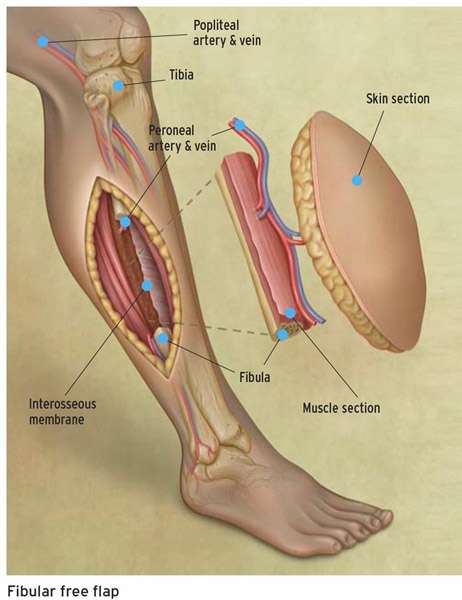At Dr Tayyab saleem malik clinic (Cosmetic Enclave)
Free flap surgery, also known as microvascular flap surgery, is a complex reconstructive procedure used to restore form and function to areas of the body that have been damaged or lost due to trauma, cancer, or other medical conditions. It involves the transplantation of tissue, including skin, muscle, fat, and blood vessels, from one part of the body (donor site) to another (recipient site).
The term “free flap” refers to the fact that the transplanted tissue is completely detached from its original blood supply and reconnected to blood vessels in the recipient site using microsurgical techniques. This allows for the transfer of living tissue with its own blood flow, ensuring its survival and integration into the new location.
Free flap surgery is often performed when other reconstructive options, such as skin grafts or local tissue rearrangement, are not feasible or would not provide optimal results. It is commonly used for breast reconstruction following mastectomy, head and neck reconstruction after cancer removal, lower limb reconstruction for severe trauma, and complex wound reconstruction in various areas of the body.
The procedure typically involves harvesting tissue from areas like the abdomen (deep inferior epigastric artery perforator or DIEP flap), thigh (anterior lateral thigh or ALT flap), or buttock (gluteal free flap). The donor site is carefully closed, and the harvested tissue is transferred to the recipient site, where the blood vessels are meticulously connected to those in the area using microsurgical techniques.
Free flap surgery is highly intricate and requires a skilled surgical team experienced in microvascular techniques. It is performed under general anesthesia and may involve a prolonged operating time. The recovery period after free flap surgery can be lengthy, involving hospitalization, monitoring of the transplanted tissue, and rehabilitation to regain function in the affected area.
While free flap surgery offers excellent reconstructive outcomes, it also carries risks and potential complications, including tissue loss, infection, bleeding, and problems with blood flow to the transplanted tissue. Therefore, it is essential to have a thorough consultation with a qualified reconstructive surgeon to assess your specific needs, discuss the potential risks and benefits, and determine if free flap surgery is the appropriate option for your case.
Overall, free flap surgery is a sophisticated reconstructive technique that allows for the transfer of living tissue to restore form and function in complex cases. It can significantly improve the quality of life for individuals who have experienced significant tissue loss or deformity, offering them a chance at enhanced physical and emotional well-being.

